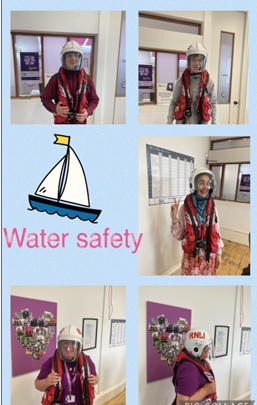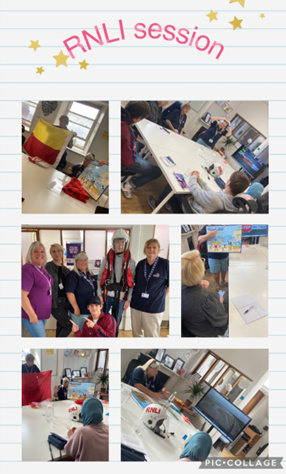ESOL into Work – RNLI session
We are so lucky where we live to be close to the coast and have many beautiful beaches. However, that can lead to accidents happening in the water. If you come from a land locked country, the allure of the water, sparkling in the sunshine and the heat of an occasional heatwave in Britain might just tempt you into the water. You notice the red flags on the beach; they look pretty blowing in the breeze. You are unaware of the danger. You step into the water, it’s cold at first but you begin to paddle and enjoy the feeling of the sand beneath your feet. You get caught up in the feeling, it’s new, it’s exciting. You wade out a bit further, the sea is so calm, so relaxing. What you don’t realise, whilst you’ve been in the moment is that the tide is coming in and you have been cut off on a sandbank. You have no idea what to do…
We invited the RNLI in to give a presentation to our ESOL into work group as we knew it would be an important addition to our refugee and asylum project. The work we do around preparing the group for work is important however we also understand that helping our participants to have a greater understanding of not only their community, but local environment is just as important. It helps them to adjust and be safe in their new environment.
That’s why the session was so important. The RNLI used videos and visuals explaining the dangers of our coast. They brought different flags and explained what they mean in. The group were allowed to try on RNLI helmets and life jackets which they enjoyed. These practical and visual resources really helped the message to get across. The participants were able to point out dangers on the pictures.

They were taught the importance of learning how to float if they fall in the water accidentally. They were also made aware of the number for the emergency services. We can’t assume that people have the knowledge that we take for granted.
The RNLI also talked about their own experience of volunteering and how it enriches their lives. This led to them advising the group of opportunities that would be available to them. We want the group to understand that volunteering comes in many different forms and covers a wide section of society.

Fantastic feedback from the participant too:
‘I enjoyed the session, and I was able to ask questions about the beach and water safety.’
‘Trying on the helmet was fun.’
‘It made me realise that I need to be careful at the beach.’
‘I was able to share this information with my friends also from Ukraine.’
In a few weeks, we’re also heading over to the lifeboat station and combining some on-site learning with volunteering (which looks fantastic on a CV!). This visit will give participants a chance to see the RNLI team in action, explore the lifeboat station, and take part in meaningful volunteering activities that build confidence, community connection, and transferable skills.
Volunteering is a powerful way to gain experience, meet new people, and contribute to something bigger. For many in our ESOL into Work programme, it’s also a first step toward feeling truly at home in a new place.
We’re proud to support learning that goes beyond the classroom, helping people stay safe, feel cared for, lncluded, and discover new opportunities.
👉 Want to learn more about our ESOL into Work programme and how we support refugee and asylum seeker communities?
Drop us an email at
